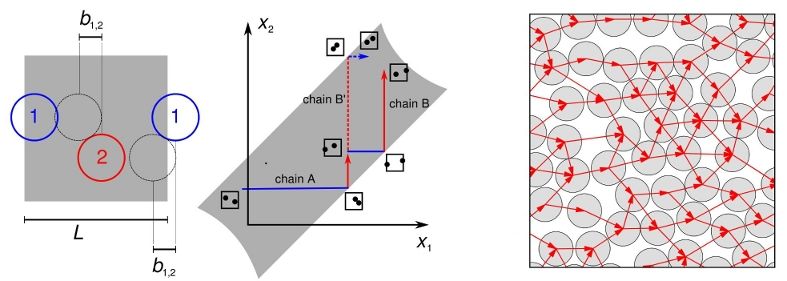Kapfer Krauth 2013
From Werner KRAUTH
| Revision as of 15:08, 15 August 2013 Werner (Talk | contribs) ← Previous diff |
Revision as of 15:08, 15 August 2013 Werner (Talk | contribs) (→Paper) Next diff → |
||
| Line 19: | Line 19: | ||
| [http://arxiv.org/pdf/1301.4901v1 Electronic version (from arXiv, original version)] | [http://arxiv.org/pdf/1301.4901v1 Electronic version (from arXiv, original version)] | ||
| + | |||
| [http://dx.doi.org/10.1088/1742-6596/454/1/012031 Final version (open access, available to everyone)] | [http://dx.doi.org/10.1088/1742-6596/454/1/012031 Final version (open access, available to everyone)] | ||
Revision as of 15:08, 15 August 2013
S. C. Kapfer and W. Krauth Sampling from a polytope and hard-disk Monte Carlo arXiv 1301.4901
Contents |
Paper
Abstract The hard-disk problem, the statics and the dynamics of equal two-dimensional hard spheres in a periodic box, has had a profound influence on statistical and computational physics. Markov-chain Monte Carlo and molecular dynamics were first discussed for this model. Here we reformulate hard-disk Monte Carlo algorithms in terms of another classic problem, namely the sampling from a polytope. Local Markov-chain Monte Carlo, as proposed by Metropolis et al. in 1953, appears as a sequence of random walks in high-dimensional polytopes, while the moves of the more powerful event-chain algorithm correspond to molecular dynamics evolution. We determine the convergence properties of Monte Carlo methods in a special invariant polytope associated with hard-disk configurations, and the implications for convergence of hard-disk sampling. Finally, we discuss parallelization strategies for event-chain Monte Carlo and present results for a multicore implementation.
Electronic version (from arXiv, original version)
Final version (open access, available to everyone)

